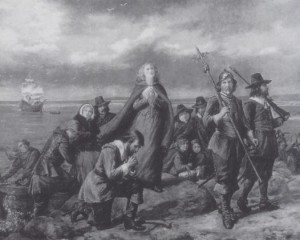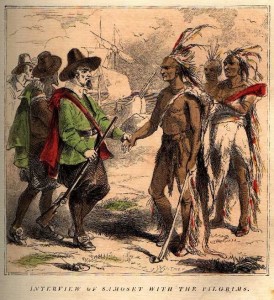Listen to or download this week’s radio program:
© 2015 Don Pinson / To Download, right-click here: [Download]
The Pilgrims landed in America nearly 400 years ago. But do you know why they came to America? Was it to start a new life? Well, yes. But what kind of life? Was it so they could be free? Well, yes—but what kind of freedom were they looking for? Because most of us don’t know the answer to these questions is why we continue to accept—or even vote for— more and more of the slavery from which they were fleeing.
 Perhaps you would say, “They came here for religious freedom.” And you would be right. But—what kind of religious freedom? Did they come merely so they could sing songs to God and study the Bible in their own gatherings? No, they came with a much broader desire than that. You see, the Pilgrims understood they must be able to create a community with institutions based in the Bible. They understood something we’ve forgotten in the last 100 years, that is, that all law is just the codification of some religious belief! In other words, civil law will either protect the right to “propagate the Gospel of the Kingdom of Christ” or it will block the “propagation of the Gospel of the Kingdom of Christ”. And there would be no middle ground. They knew there is no such thing as neutral civil law—unlike what we have been told by those in education and media who hate God and the Bible. The secularists would like us to believe there is neutral law. If we do, we help them move toward law that is directly against the Bible. And make no mistake about it that is where they want to take us!
Perhaps you would say, “They came here for religious freedom.” And you would be right. But—what kind of religious freedom? Did they come merely so they could sing songs to God and study the Bible in their own gatherings? No, they came with a much broader desire than that. You see, the Pilgrims understood they must be able to create a community with institutions based in the Bible. They understood something we’ve forgotten in the last 100 years, that is, that all law is just the codification of some religious belief! In other words, civil law will either protect the right to “propagate the Gospel of the Kingdom of Christ” or it will block the “propagation of the Gospel of the Kingdom of Christ”. And there would be no middle ground. They knew there is no such thing as neutral civil law—unlike what we have been told by those in education and media who hate God and the Bible. The secularists would like us to believe there is neutral law. If we do, we help them move toward law that is directly against the Bible. And make no mistake about it that is where they want to take us!
The Pilgrims had already experienced religious persecution by the civil authorities in England. When they fled to Holland for eleven years they experienced economic persecution by the civil authorities. They learned the hard way that “all law is just the codification of some religious belief.” So they came to America and unashamedly created civil laws based in the Bible. Their civil government unashamedly protected the right of their children to build a community that would allow them to hear and live out the Gospel of the Kingdom of Christ. Simply put: Being able to take the Gospel of Christ to the next generation was the reason for us being alive. Thus every institution, be it educational, economic, or governmental, existed only for the same reason! This is why the great statesman, Daniel Webster, said,
“Our ancestors established their system of government… with the very first foundations laid under the divine light of the Christian religion….They journeyed by its light and labored in its hope. They sought to…diffuse its influence through all their institutions, civil, political, or [educational]. Let us… extend this influence still more widely; in full conviction that that is the happiest society which partakes in the highest degree of the… spirit of Christianity.”
(Webster, Daniel. The Works of Daniel Webster (Boston: Little, Brown and Company, 1853), Vol. I, p. 48. Foster and Swanson. The American Covenant – The Untold Story (Roseburg, OR: Foundation for Christian Self-Government, 1981; Thousand Oaks, CA: The Mayflower Institute, 1983, 1992), p. 158. )
Only if we rediscover this as the mission of the American Republic can we come back into the purpose God has for us.
 This is why John Adams, signer of the Declaration of Independence, said,
This is why John Adams, signer of the Declaration of Independence, said,
“…this constitution was made only for a moral and religious people. It is wholly inadequate for the government of any other.”
(America’s God & Country, p.10)
The bottom line is: If liberty is to exist, it must be cradled in Biblical living. If not supported by total commitment to Jesus Christ it will die from exposure to the selfishness of secularism.
“Where the Spirit of the Lord is, there is liberty.”
(2 Corinthians 3:17)
Think about it; because if you don’t, someone else will do your thinking for you—and for your children! And you won’t like what that brings to you. I’m Don Pinson; this has been Think About It.

